Move-In Recycling
http://http://amcult204.wixsite.com/moveinrecycling
If other:
1. Where is the biggest impact of this project?
Campus
If other:
2. What were the goals for your project?
To encourage the moving-in process of incoming students to recycle. This could impact human behavior beyond the first year after graduating. Some questions we were thinking about are: 1. Are there external influences that can cause students to participate in eco-friendly environments? 2. What kind of psychological incentives are there to encourage sustainable behavior?
3. What strategy did you use?
Advocacy, Communications/Marketing, Education, Research
If other:
4. Did you accomplish the goals you set for this project? Please explain.
Yes, we presented our research and website.
In the end, we concluded that the best way to implement our ideas is to have a dorm commitment contract and Blue Bucks (dorm cafe currency) as a token reinforcement.
5. Choose your impact measure type.
Pounds of food composted
What were the measurable outcomes of your project?
There has been a new sustainability initiative that has been taken into affect that also reduces waste by having better waste bins labels (to demonstrate what actually can be thrown away and what can be recycled).
6. When did you begin and complete your project?
We starting researching this project a few weeks into a semester of January and completed it by the end of April.
7. What was challenging about your project and how did you respond?
University of Michigan already has existing practices and websites about current recycling practices that are either not eye catching or informational enough to incoming freshmen or movers. Breaking this habit and implementing new ideas that is both graphically appealing and informationally rewarding is what is challenging.
8. Which groups were involved in this project? Students, faculty, staff or community groups?
Students: Derick Adams, Andrea Marquez (myself), Jean Richmann, Amanda Schoonover, and Taylor Trott.
The professor's name is Michaela Zint.
9. Was your project funded? If so, how?
It was not funded.
10. How did you communicate about this project and educate the broader campus and/or community?
We communicated the project by presenting it to the class and to a board of members from the University of Michigan in charge of implementing new policies on campus.
11. How have you evaluated your project?
Group reflection, Other
If other, please describe:
The professor evaluated the work. Then after the presentation, optional input was received by members from the University of Michigan council and classmates.
12. What did you do after your reviewed your project?
Communicated your project results through a blog or other media, Presented your project results at a conference or meeting
If other, please describe:
13. What was the biggest or best thing you learned from your project?
Experience has a lot to do with how a person continues to perform and choose to make their decisions accordingly. Based on research, if an individual responds positively in a situation, he or she will most likely continue it. Likewise, sustainable behavior can be positively reinforced with good experiences using events students can participate in so they will be more involved in the topic.
14. What advice would you give to others working on a similar project?
I would give the advice of entrepreneurship. Our group created a twitter account, a website, and proposed an event. It is with these ideas, that migrate to other places that don't only focus on campus communities.
15. Based on your response above, what are your future plans for this project? And are there resources (people, financial, etc.) available to sustain it?
Incoming students of the class can improve upon it. I, myself, however, can start to inform people in my current area of residence ways to reduce waste and encourage recycling. I wish to create a website that can better inform people ways to stay environmentally friendly.
Category ARCHIVED | PROJECT CERTIFICATION
Form Details
Average Rating:
Date Added: Sep 1, 2016
Date Last Modified: Sep 1, 2016







Project Feedback